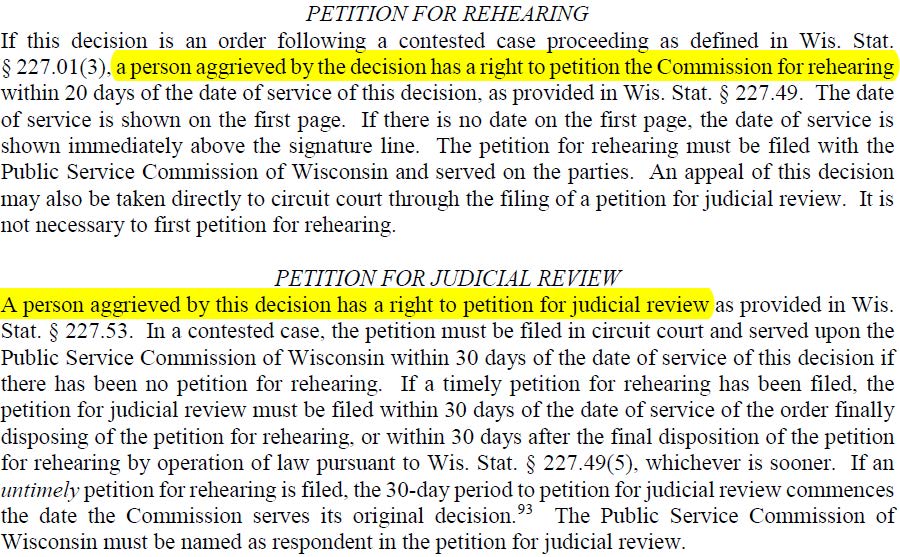Prehearing Conference of the Multitudes
January 2nd, 2019

Tomorrow, at 10 a.m. (gasp!), there’s a Prehearing Conference for the Cardinal-Hickory Creek transmission project in Wisconsin.

WATCH HERE!! (info and link posted soon??)
This Prehearing Conference is being held for the express purpose of addressing the multitudes of potential intervenors in this docket. After that, there will be yet another prehearing conference for scheduling purposes. Here’s the ALJ’s missive outlining the situation and his probable approach:
I’m not at all happy about having to take a full day out of my intense work week (LOTS due next week!) to go to Madison and deal with this fiasco. Oh well…
From Judge Newmark’s prehearing missive:
The 76 requests break out into the five following groups: 1) three units of government; 2) eight organizations; 3) four individuals filing electronically; 4) 11 individuals filing by U.S. Mail; and 5) 50 individuals, municipalities, and an organization that appear to have common interest, and to whose requests appear filed in a common fashion.
“50 individuals, municipalities, and an organization that appear to have common interest, and to whose requests appear filed in a common fashion.” Appear?? That’s a generous description. It’s clearly orchestrated, with form interventions that are not individualized. The “Group 4” intervention requests also use the same form, but were mailed in, by likely Amish potential intervenors, presenting another issue, both in that ERF filing is required, and that if they would be allowed to intervene using paper copies, that means each filing would need to be printed out and mailed to them, creating a large burden on all the parties, particularly intervening parties. This is an area where assistance in ERF filing is needed, it’s crucial to assure Amish can participate.
Why are there “the multitudes” showing up in this docket, the 11 in “Group 4” and the 50 in “Group 5?” Rob Danielson and cohorts of SOUL and “EPIC” held meetings in and around the project area and recruited people to sign up to intervene. They used forms, where people just had to sign the forms. The forms were collected and much later uploaded to ERF, the PSC’s eFiling system. What information did they receive before signing, what did they know about the rights and responsibilities of intervention? See for yourself:
Note that it’s form/boilerplate language that’s been used in both Groups 4 & 5, and note the many that only list “WI, USA” as the address — the people who signed the document did not upload those “intervention requests.” Was there a detailed description and warning of what’s required, the commitment necessary, to intervene in a docket? Did they understand the commitment necessary?
This is one of those “too clever” machinations, strategy, tactics, that gums up the works. See SCR 20:3.5(d). It looks like there was little attention paid to the potential results of this action, or that attention was paid, and this result is what they wanted. It’s important that people be informed of, understand, and agree to what it is that they’re signing up for. See SCR 20:21 Advisor. I don’t think that’s been happening.
What are they signing up for? Well, SOUL just filed “SOUL Intervention focus and limits on representation 1-2-2019” which shows that SOUL has no intention of helping them through the process.
There’s also been ex parte contact, somebody thought that that was a good idea (?!?!?!), somebodies who should have known better. The “no ex parte contact” rules need to be clearly spelled out, the ALJ’s “Intervenor Communication” missive about that was not as specific as it could have been. Contact the judge? JUST DON’T!!
Apparently, part of the SOUL speil is that people must intervene to have the right to appeal, that you must intervene or you lose your rights. THAT’S NOT TRUE!! Here’s part of the notice that follows at the end of every PSC transmission order, clearly stating that “a person aggrieved by this decision has a right to petition” for rehearing and/or judicial review:

You can find this language, for example, at the end of the Badger Coulee transmission Order:
Judge Newmark’s proposed consolidation approach makes sense to me for a few reasons:
- When someone solicits and recruits interventions, they have an ethical and moral responsibility to give full disclosure of the meaning and responsibility of intervention. How many of these “intervenors” would intervene if they knew they’d have to show up for Prehearing Conferences, Public and Technical Hearings, review the thousands of pages and participate in a meaningful way?
- When someone solicits and recruits interventions, they have an ethical and moral responsibility for the result of their solicitation and recruitment. In this case, consolidation may be the result. That’s one way to hold the solicitor/recruiter responsible. I’m thinking about this, trying to come up with other options.
- Non-attorneys and attorneys not licensed to practice law in Wisconsin are allowed to practice before the Public Service Commission. As Judge Newmark clearly noted in the Badger Hollow prehearing conference, non-attorneys are bound by Wisconsin Rules of Professional Conduct. Non-attorneys may be held to this standard when practicing before the Commission. All parties need to review the rules, in light of its solicitation and recruiting, and can and should shoulder their responsibility for what they’ve created, as an “umbrella” or helping individually those who want to participate.
- Line up assistance to Amish participants so they can participate and intervene if they are granted intervention, and help to comment if they are not. Because the “Group 4” have used the same form as “Group 5,” a SOUL member with filing expertise could be assigned to facilitate their participation.
- Line up assistance for “Group 5” people so they can participate meaningfully. It’s a lot to figure out, and many have no idea what ERF is. Intervention is a part-time to full-time job.
Something Judge Newmark has utilized previously could be useful here. He has allowed “non-party briefs” if requested and approved prior. This is authorized under Wisconsin Code PSC 2.20(3). If this option were provided to potential intervenors, for those not wanting to or prepared to dive in, for those not meeting intervention requirements, that would give the multitudes the opportunity to weigh in with more weight than just a public comment, to address their concerns, and would require less commitment than participating in a full-blown intervention. Intervention lite. Perhaps those not wanting to be consolidated under SOUL’s umbrella could be extended the opportunity to file a non-party brief, in their own words uniquely addressing their own specific concerns (unlike the many form “interventions” that have been filed).
Tomorrow? Oh, it will be a circus…

Leave a Reply